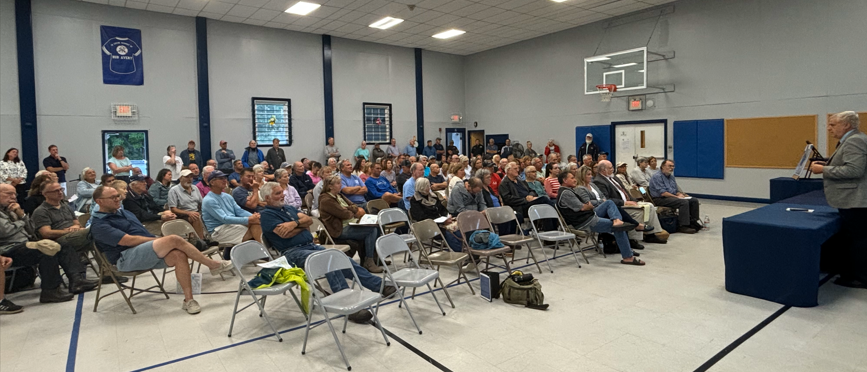By PAULA TRACY, InDepthNH.org
OSSIPEE – Lakefront property owners and residents made it clear at a public meeting Friday they do not like the state Department of Environmental Services process for approving docks and were told that it would require a legislative fix in the law.
The public information session at Ossipee Town Hall was attended by more than 100 people, many of whom objected to the approval of a five-finger docking structure on an island in Leavitt Bay.
In May, the DES approved an 82.5 foot by 3 foot wharf, with five, 34 foot by 3 foot piers accessed by a 6 foot by 4 foot walkway based upon the owner’s size property, and what is allowed under state law.
The size of the docking structure and its nine boat slips would make it the largest known approved non-commercial docking structure on Ossipee Lake, according to members of the Lake Ossipee Alliance.
Opponents say the approval was unreasonable and threatens Leavitt Bay’s boating, wildlife and environment and that the state made no considerations for issues like cyanobacteria, milfoil or other concerns in the lake.
They were told by Rene Pelletier that docks have very little to do with those issues. He heads the water division for the state DES and has been working on lake issues for the state for 52 years.
Executive Councilor Joe Kenney, R-Wakefield, convened the meeting after DES approved the structure on Loon Island after attending a meeting of concerned property owners who complained about the lack of transparency in the process.
While an attorney for the island owners said the owners are willing to reduce the five-finger dock to two, many shouted “no” and would not accept that as a compromise.
Kenney was accompanied by Pelletier and Assistant DES Commissioner Adam Crepeau who answered questions, though he was often interrupted by members of the crowd and tried to explain the law as it relates to the permit approval.
He suggested that a legislative fix might be an approach as his department followed the letter of the law in what was permitted.
The island is owned by Ossipee residents Deborah and Kevin Randall.
The couple told Ossipee officials the docks were needed to prevent boaters from trespassing on the 0.91-acre property, which is undeveloped and uninhabited.
There is a nearby loon nesting site.
Kenney attended Broad-Leavitt Bay Association’s annual meeting last month and said he thought DES “missed the boat” by not holding a public hearing on the matter before it approved the application.
The DES does not require a hearing but Crepeau said there are hearings if there is a major public interest in the project.
Residents and property owners said they did not know about the approval until after it was given.
Kenney said that while there was no legal mechanism for DES to hold an after-the-fact hearing, he would arrange for the group and others to be heard in a public forum.
More than 200 lake property owners joined the groups to file a Preliminary Notice of Appeal asking DES to enter into mediated discussions about the approval.
After DES decided against an appeal, the group petitioned the Governor and Executive Council to ask them not to sign off.
A compromise which was offered by the Randalls, to reduce the size of the project by more than 50 percent, would likely be approved and not require council approval, Crepeau said.
Many of the attendees, who have docks approved by the state, said they were wondering what has changed since they got their permits and why this process seemed expedited.
Bill Winter of Leavitt Road said he wanted to know what has changed over the years on permitting docks and said he waited nine months and had to go to Concord with detailed drawings of the dock and did not understand why it took so long then.
“Something has changed from 2009,” he said.
“I think we have streamlined the process,” said Crepeau to jeers, “boos” and shouting. He said the agency follows legislatively promulgated laws.
“The legislature sets the policy agenda,” and he said this might be a legislative fix that the department has no control over.





